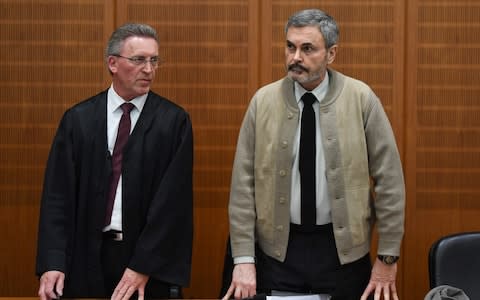Swedish 'laser man' handed life sentence in Germany for murdering Holocaust survivor

A Swedish white supremacist and attempted serial killer was jailed for life in Germany on Wednesday for the murder of a Holocaust survivor more than 25 years ago.
John Ausonius, known as “Laserman” in his native Sweden, was found guilty of shooting dead Blanka Zmigrod, a 68-year-old cloakroom attendant, near her Frankfurt home in February 1992.
The 64-year-old Ausonius has already served more than two decades of a life sentence in Sweden for a racially motivated shooting spree in which he killed an Iranian man and seriously injured ten others.
He is now expected to spend the rest of his life behind bars after being extradited to Germany and handed a second life sentence for the killing of Zmigrod.
Ausonius is thought to have inspired Anders Breivik, the far-Right extremist who massacred 77 people in Norway in 2011, and the National Socialist Underground (NSU), a neo-Nazi terror group which killed ten people in Germany between 2000 and 2007.
He was jailed in Sweden for a series of racially motivated shootings in 1991 and 1992 in which he targetted immigrants and foreign students. He became known as “Laserman” because he used a rifle with a laser sight.

The killing of Zmigrod hundreds of miles away in Germany at first baffled police. The 68-year-old Holocaust survivor was shot dead outside her home in Frankfurt in February 1992. A witness saw a man leaving the scene on a bicycle with Zmigrod’s handbag, and it was at first thought the motive was simple robbery.
But it later emerged that Ausonius, who was on the run from Swedish police at the time, had been seen arguing with Zmigrod at the restaurant where she worked as a cloakroom attendant the day before her murder.
The court heard how Ausonius had accused Zmigrod of stealing a small electronic notebook from his coat while it was in the cloakroom. The prosecution argued that the notebook contained names and addresses Ausonius needed for his planned escape to South Africa.
Ausonius denied the killing in court. He admitted responsibility for the Swedish shooting spree but denied it was racially motivated and claimed he carried it out to divert attention from bank robberies he had committed.
German police closed their initial investigation into Ausonius in 1996 after failing to uncover any proof linking him to Zmigrod’s killing. But the case was reopened in 2014 and prosecutors travelled to Sweden to question him.
“I simply couldn't live with the fact that the investigation had been closed,” Nadja Böttinger, the prosecutor in charge of the case told Stern magazine.
“He could remember many details, but as soon as it concerned something relevant to the case, he suddenly didn’t know anything.”
It was not immediately clear whether Ausonius would serve his sentence in Germany or be returned to prison in Sweden.

 Yahoo News
Yahoo News 